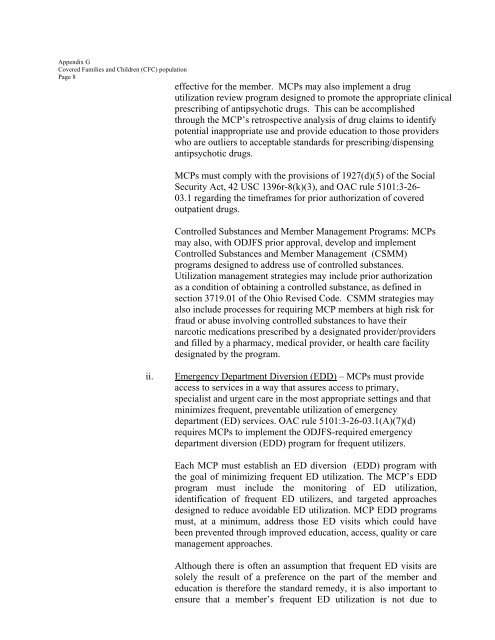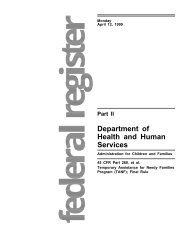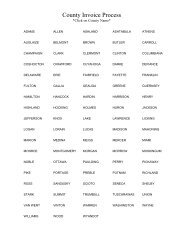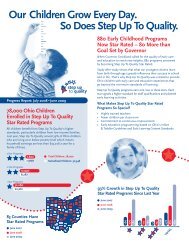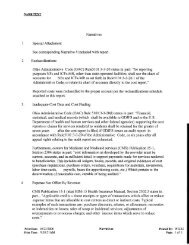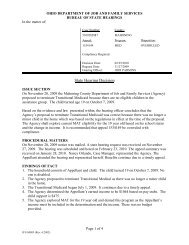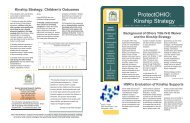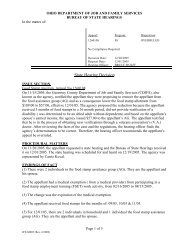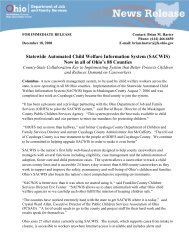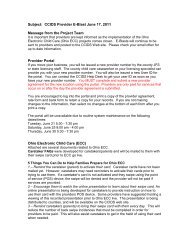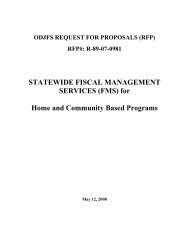Regional Generic Provider Agreement - Ohio Department of Job and ...
Regional Generic Provider Agreement - Ohio Department of Job and ...
Regional Generic Provider Agreement - Ohio Department of Job and ...
You also want an ePaper? Increase the reach of your titles
YUMPU automatically turns print PDFs into web optimized ePapers that Google loves.
Appendix G<br />
Covered Families <strong>and</strong> Children (CFC) population<br />
Page 8<br />
effective for the member. MCPs may also implement a drug<br />
utilization review program designed to promote the appropriate clinical<br />
prescribing <strong>of</strong> antipsychotic drugs. This can be accomplished<br />
through the MCP’s retrospective analysis <strong>of</strong> drug claims to identify<br />
potential inappropriate use <strong>and</strong> provide education to those providers<br />
who are outliers to acceptable st<strong>and</strong>ards for prescribing/dispensing<br />
antipsychotic drugs.<br />
MCPs must comply with the provisions <strong>of</strong> 1927(d)(5) <strong>of</strong> the Social<br />
Security Act, 42 USC 1396r-8(k)(3), <strong>and</strong> OAC rule 5101:3-26-<br />
03.1 regarding the timeframes for prior authorization <strong>of</strong> covered<br />
outpatient drugs.<br />
Controlled Substances <strong>and</strong> Member Management Programs: MCPs<br />
may also, with ODJFS prior approval, develop <strong>and</strong> implement<br />
Controlled Substances <strong>and</strong> Member Management (CSMM)<br />
programs designed to address use <strong>of</strong> controlled substances.<br />
Utilization management strategies may include prior authorization<br />
as a condition <strong>of</strong> obtaining a controlled substance, as defined in<br />
section 3719.01 <strong>of</strong> the <strong>Ohio</strong> Revised Code. CSMM strategies may<br />
also include processes for requiring MCP members at high risk for<br />
fraud or abuse involving controlled substances to have their<br />
narcotic medications prescribed by a designated provider/providers<br />
<strong>and</strong> filled by a pharmacy, medical provider, or health care facility<br />
designated by the program.<br />
ii. Emergency <strong>Department</strong> Diversion (EDD) – MCPs must provide<br />
access to services in a way that assures access to primary,<br />
specialist <strong>and</strong> urgent care in the most appropriate settings <strong>and</strong> that<br />
minimizes frequent, preventable utilization <strong>of</strong> emergency<br />
department (ED) services. OAC rule 5101:3-26-03.1(A)(7)(d)<br />
requires MCPs to implement the ODJFS-required emergency<br />
department diversion (EDD) program for frequent utilizers.<br />
Each MCP must establish an ED diversion (EDD) program with<br />
the goal <strong>of</strong> minimizing frequent ED utilization. The MCP’s EDD<br />
program must include the monitoring <strong>of</strong> ED utilization,<br />
identification <strong>of</strong> frequent ED utilizers, <strong>and</strong> targeted approaches<br />
designed to reduce avoidable ED utilization. MCP EDD programs<br />
must, at a minimum, address those ED visits which could have<br />
been prevented through improved education, access, quality or care<br />
management approaches.<br />
Although there is <strong>of</strong>ten an assumption that frequent ED visits are<br />
solely the result <strong>of</strong> a preference on the part <strong>of</strong> the member <strong>and</strong><br />
education is therefore the st<strong>and</strong>ard remedy, it is also important to<br />
ensure that a member’s frequent ED utilization is not due to


